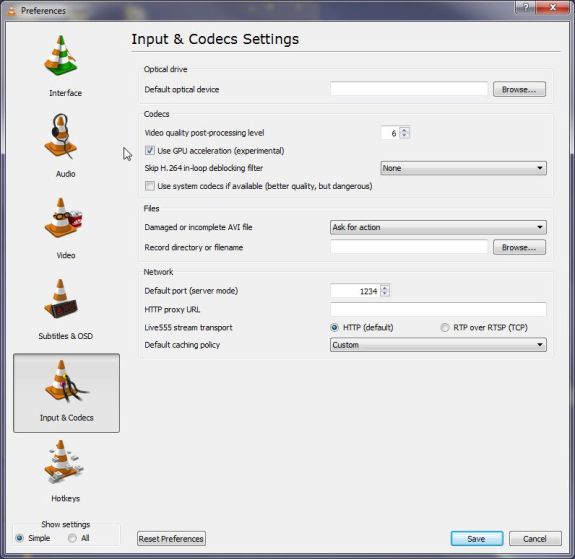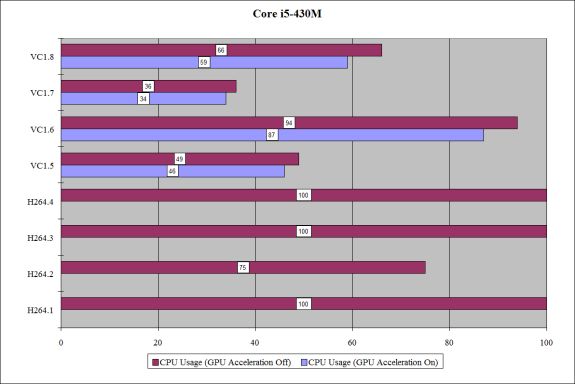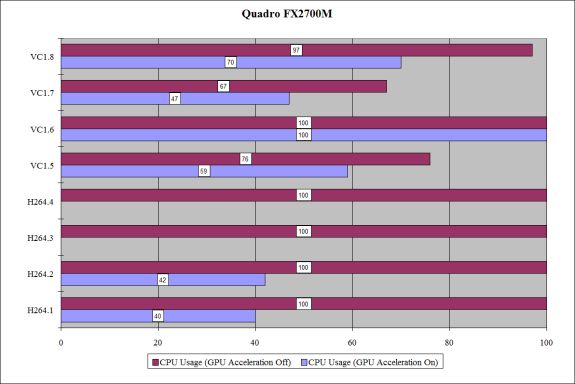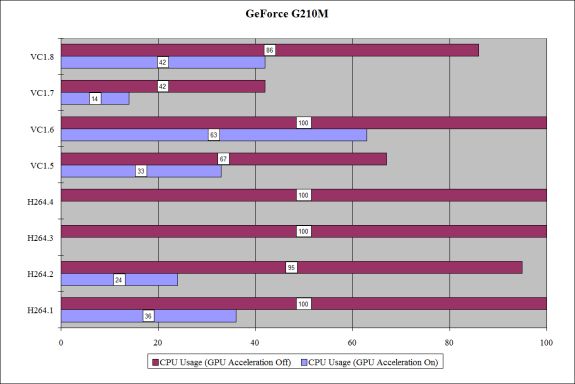HD Video Decoding on GPUs with VLC 1.1.0
by Ganesh T S on June 25, 2010 4:35 AM EST- Posted in
- Home Theater
- HTPC
After installing VLC 1.1.0, I was surprised to find that Blu-Ray sample clips continued to stutter during playback. I then realized that GPU acceleration was disabled by default. The option is hidden in the Preferences window accessible through the Tools menu.
The three graphs below show the maximum CPU usage during the course of playback with and without GPU acceleration (X-axis) for each of the 8 files listed in the previous section (Y-axis). A completely unwatchable video has no entry corresponding to it. Most of the videos showing 100% utilization were watchable except for a few stutterrs and dropped frames.
A quick look at the graph for the Intel i5-430M below show that the VLC - GPU interaction for H.264 is a complete failure. Upon initializing any H.264 stream, the screen turned completely green. On the other hand, VC-1 decode acceleration is not broken like H.264. CPU usage is lesser with acceleration turned on, but not by much. On being contacted with these details, VLC developer Jean-Baptiste Kempf indicated that the issue was quite simple, and was quite confident that the code would work as soon as the developer team had access to an Intel box.
Moving on to Nvidia's PureVideo VP2 decoder in the Quadro FX2700M, we find that both the L4.1 H.264 streams were accelerated without issues. However, L5.1 videos having more than 4 reference frames were rendered unwatchable due to extensive artefacting despite the fact that CPU usage remained low. From the same graph, we also find that VC-1 videos aren't accelerated as well as H264. This is due to the fact that the VP2 decoder doesn't provide VLD acceleration for VC1, but only IDCT. VLC manages to make use of the IDCT acceleration a little bit, but, obviously, the results are not as good as what one could achieve with VLD.
The GeForce G210M has Nvidia's latest PureVideo VP4 decoder (which supports acceleration for even MPEG-4 / DivX, but we are not testing those here). We observe that both H264 and VC-1 get accelerated as expected, but the L5.1 streams still have an issue. Jean-Baptiste Kempf seems to think that the L5.1 problem could be a result of issues with Nvidia's drivers as well as VLC code. A fix is expected once a bug report with a sample file is filed.














74 Comments
View All Comments
puffpio - Friday, June 25, 2010 - link
uh that's not truethere exists some dvds that are encoded interlaced..some dvds that are of old tv shows, for example
ganeshts - Friday, June 25, 2010 - link
barniebg, I agree with you!However, VLC developers are more interested in maintaining consistency across platforms and the framework, rather than improving performance and quality on a single type of system.
Currently, VLC uses CPU SSE2 instructions to implement the Yadif deinterlace filter [ http://avisynth.org.ru/yadif/yadif.html ]. I am trying to find out how it compares with GPU deinterlacing (any benchmarks?). If the performance is similar, but we just take a CPU usage hit, it might not be such a bad thing after all (since VLC wishes to cater to the lowest common denominator amongst media player users)
ganeshts - Friday, June 25, 2010 - link
Note: VLC devs recommend use of Yadif over other deinterlacing mode options which might be availablepaulpod - Friday, June 25, 2010 - link
It is a bad joke for anyone to claim hardware acceleration of video when deinterlacing is not included. But you get what you pay for, I guess.Software and CPUs can decode any video format at full quality without much effort. It is deinterlacing that requires GPU acceleration because detection of moving diagonal edges is extremely compute intensive. And as people have pointed out, most TV broadcast is 1080i mpeg. Yes, the Olympics, the World Cup (in Spanish with better announcers than ESPN), and other little things like that.
Let's hope the simple API connections necessary for them to support deinterlacing will be in a future release, at least to the point where they pass control to the graphics driver.
Rainman200 - Friday, June 25, 2010 - link
Your opening comments about MPC-HC are a bit inaccurate.1) That guide linked to is overkill, intended for very specific anime people.
2) The CCCP pack installs MPC-HC but has nothing to do with it. Codecs packs are a bad thing in general go ask anyone on Doom9 forums though MPC-HC is directshow capable unlike VLC.
To enable DXVA playback under MPC-HC you just install the player and change the output to EVR-Custom thats it no other changes are necessary nor any codec packs.
If it doesn't work then it a hardware/driver issues but not the fault of MPC-HC.
That said its good to see VLC add this support, XBMC is also working on DXVA2/VAAPI and CrystalHD support.
ganeshts - Friday, June 25, 2010 - link
I first started using MPC-HC when I was on WinXP.I remember the countless nights I spent in trying to accelerate some HD files. It refused to do DXVA till some registry entries were modified to make it ignore L4.1 restrictions. Even then, some files would work better with the Cyberlink decoder, and hence I had to make mods in MPC-HC to load that filter. All in all, it was a bit of a trying (but ultimately satisfying -- after I moved to Win7) experience.
I agree that the recent releases work much better than the ones I used to tussle with, but I still see the comments list on that anime blog being updated years after it was first posted! I would assume that this means MPC-HC offers options / makes users want options which can easily make them shoot themselves in the foot!
PS : I love MPC-HC! All my MKVs and M2TS default to that, but for everything else, I still use VLC :)
ciukacz - Friday, June 25, 2010 - link
AFAIK there is no standardized API for HD audio bitstreaming under Windows (and probably under other OS's too). developers have to add it "per device". with a development team of 5 it is wishful thinking.Nehemoth - Friday, June 25, 2010 - link
Kmplayer had hardware acceleration since a lot of time ago and as VLC you don't need to install codecs pack, even better in Windows 7 you can use the system codecs if you want to.I would like to see kmplayer against VLC.
piroroadkill - Friday, June 25, 2010 - link
Kmplayer is a rip off of Media Player Classic...http://en.wikipedia.org/wiki/K-Multimedia_Player#C...
CSMR - Friday, June 25, 2010 - link
Spotty DXVA in VLC is not news. Even if VLC gets perfect playback, including subtitles, all popular formats, and is customizable, then you just have a competitor to MPC-HC, good but not exactly a step forward for the HTPC world.MPC-HC has no problems with DXVA playback on any modern mainstream GPU (including integrated). You do not need a tutorial to do this; the link is for people who want to get all the settings right, because MPC-HC is very customizable.
The only important free media players atm for HTPC users are MPC-HC, because it is the best, and WMP, because it is popular and integrated into WMC.